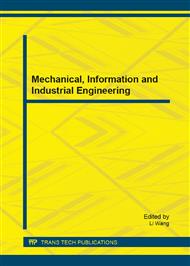p.823
p.830
p.834
p.839
p.843
p.847
p.852
p.857
p.861
Research of Energy Optimization Strategy for WSN
Abstract:
The energy of the nodes in wireless sensor network is very limited. Power supply module power supply, not only need to give themselves also need to collect data of the sensor power supply, monitoring data sending and receiving, processing, also need to consume energy. If the node due to run out of battery and enter a state of "death", can cause the node collection data loss; If the node is terminal nodes, only this node data loss; But if the node is routing nodes, not only can cause data loss of this node, also can cause by all nodes of the node for data transmission loss of data. So, the question of energy consumption becomes a research focus in the field. Through the architecture of wireless sensor network and the analysis of the wireless sensor network protocol stack, according to the characteristics of the wireless sensor network (WSN) and energy optimization strategy of background points out the necessity of energy optimization. By analyzing the energy consumption of wireless sensor network, the wireless sensor network energy optimization strategy is given.
Info:
Periodical:
Pages:
843-846
Citation:
Online since:
March 2015
Authors:
Price:
Сopyright:
© 2015 Trans Tech Publications Ltd. All Rights Reserved
Share:
Citation:


